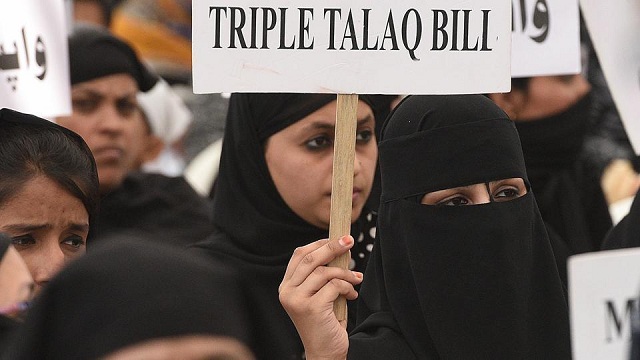The Parliament has passed the "Muslim Women(Protection of Rights on Marriage) Bill 2019", commonly known as Triple Talaq Bill. The Lok Sabha had passed the Bill on July 25 with 303 'yes' votes against 82 'no' votes. The Rajya Sabha Chairman Venkaiah Naidu declared the Bill passed with 99 'yes' votes and 84 'no' votes.
Background:-
In August 2017, the Supreme Court had declared the practice of 'triple talaq' to be unconstitutional, by 3:2 majority.
The Triple Talaq Bill passed in last year's winter session during December 2018 had got lapsed as the Rajya Sabha did not clear it before the dissolution of 16th Lok Sabha. After that, the Centre brought in Triple Talaq Ordinance on February 21, which is sought to be replaced by the present Bill.
About Triple Talaq Bill:-
"Talaq" for the purposes of the Bill means "talaq-e-biddat or any other similar form of talaq having the effect of instantaneous and irrevocable divorce pronounced by a Muslim husband".
- The Bill declares pronouncement of talaq, including in written or electronic form, to be void and illegal.
- Pronouncement of triple talaq is proposed to be made an offence punishable with imprisonment for a term which may extend up to three years and fine.
- Cognizance of the offence can be taken only on a complaint is lodged by the victim wife or her close blood relatives.
- Also, the offence will be compoundable at the instance of the wife on such terms and conditions as deemed fit by the Magistrate.
- The offence is also bailable, and Magistrate can grant bail, but only after hearing the wife.
- The Bill provides for the grant of custody of the minor child to the wife, and also maintenance suitably determined by the Magistrate.
As per the earlier version, the offence was cognizable, which meant that anyone could have lodged FIR in respect of the practice. Also, the offences were non-bailable and non-compoundable as per the previous Bill. The present Bill changed some of the contentious provisions in the earlier Bill which was passed by the Lok Sabha in December 2017.


Post a Comment